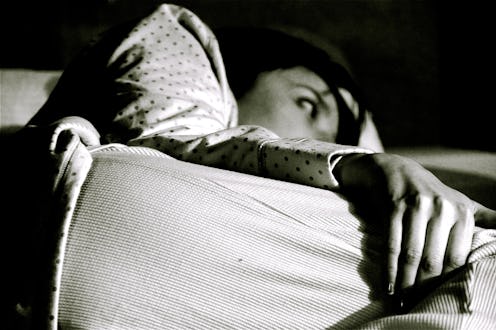Life
7 Little Things Keeping You Up At Night

I know very few people who feel like they're steadily getting enough sleep — so much so that seeing a well-rested person is like witnessing a dog walk on its hind legs. There are 60 million people a year who suffer from insomnia, and while many of them think they're taking all the necessary precautions, like taking melatonin, changing sleeping positions, and working out mid-day, they still lie awake at night and obsess over the glorious snooze they're not getting. Dr. Thomas Rosh of the Sleep Disorders Center in Detroit brings in a perspective that might help us all out, though: it's the minute details that are usually keeping us up, and it's easy to miss out on them.
Our body — and particularly our Circadian rhythms — appreciate discipline and routine, and these are the common denominators amongst the elusive folk who actually sleep enough every night. We can join this elite group of people too, if we just commit to shifting around a few of our less-than-fantastic habits. Sleep specialist and professor Dr. Michael Decker told Huffington Post that we have to put solid intentions into bedtime; it's all about "protecting our sleep." When we don't guard it as fiercely as we can, the deprivation has the ability to make us feel debilitated and unwell.
So, aside from all the basic stuff, like leaving your electronics at the door and drinking plenty of water throughout the day, it's time to pay attention to the small odds and ends. Here are seven little things that you don't realize are keeping you up at night.
1. Not Eating Enough Dinner
We all know that consuming a huge meal before bed doesn't do us any good, but not many of us know how detrimental it can be to have too small of a dinner. You'll suffer from annoying hunger pains if you limit your last feed of the day. These keep you awake and mess with your delicate sleep cycle, so you're bound to meet your alarm clock cranky and unrested. If you've always enjoyed little portions, have a healthy snack before you crawl into bed, something without sugar that will make your digestive tract happy.
2. That Extra Glass Of Wine
Don't shoot the messenger. Most of us who bring in a glass of Cabernet Sauvignon into the bedroom after dinner mean to use it as a way to relax and fall asleep — a nightcap, as we call it. But that extra bit of alcohol could end up doing the complete opposite. Dr. Michael Brus, a sleep medicine expert, told WebMD that although it makes you initially feel tired, it has a stimulating effect later, which keeps you out of your much-needed, deep REM cycles. You don't have to swear it off altogether; just give each glass you have at least one hour to digest before you ask for another.
3. Dust Mites
They're invisible, microscopic creatures that live on pillows, blankets, comforters, and sheets, and although they don't jump on your skin to bite you, they secrete a protein that can harm the respiratory system. If you find yourself sleepless, while constantly sneezing and coughing, you might want to get tested for dust mite allergies. It's not a big deal if you do have them, even it initially grosses you out — just wash everything often and keep yourself squeaky clean.
4. Washing Your Face With Cold Water
Splashing with cold water is fantastic for the skin — it closes up pores and soothes the irritated spots — but it gives you a jolt of energy, precisely the kind you don't want if you need that beauty rest. The stimulation you get actually warms up the body, tricking it into thinking you want to stay awake. Instead of going ice-cold at night, try lukewarm water and follow it up with a soothing facial toner. By all means, though, keep your morning face wash a bit chilly, if you're into that.
5. An Exciting Book
I was devastated to discover that reading a thrilling novel close to bedtime isn't a very smart choice. Those of us who do choose to read before bed probably used it as a replacement for the evil television or smartphone that was definitely wrecking our Circadian rhythms before. Surveys now show, however, that overly invigorating the intellectual mind at night can result in poor quality sleep. Maybe it's time to grab a mellow magazine instead of that nail-biting crime drama.
6. Sleeping In On The Weekends
Drastic changes in our sleep schedules on days off can mess us up on workdays when we need the most shut-eye we can get. If you like to stay up past midnight on Saturday, see your friends, and enjoy your time off in social settings, no problem. Just try to wake up relatively early on Sunday — take a power nap later in the afternoon if you need it — so that you don't have trouble catching some Zzz's before that Monday alarm clock screams at you.
7. Napping At The Wrong Time
A little snooze can boost creativity and energy, and generally perk you up — but when you indulge in it matters. The best time to nap is between 2-3 p.m., when there's a natural biological dip occurring in the body; don't stay in bed for longer than half an hour. Also, napping anytime after 4 p.m. is putting you in the real danger zone. It will leave you groggy and off-balance; then, you won't be able to fall asleep at night, no matter how tired you may feel.
Images: Alyssa L. Miller/Flickr; Giphy (7)